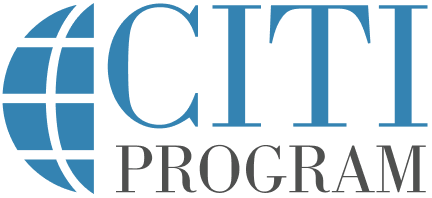The Trusted Standard in Research, Ethics, Compliance, and Safety Training
The Collaborative Institutional Training Initiative (CITI Program) is dedicated to serving the training needs of colleges and universities, healthcare institutions, technology and research organizations, and governmental agencies, as they foster integrity and professional advancement of their learners.



Explore Our Featured Courses
Provides instructions for creating the structures, personnel, and funding for a clinical research program.

Provides essential training on why privacy awareness and compliance matter.

A comprehensive introduction to ethical principles, regulations, and responsible practices that guide software and technology professionals throughout the software development lifecycle.

The course explores OPSEC in academia, training faculty, staff, and students to identify and mitigate risks to sensitive research data while upholding open science principles.

Equips university faculty, staff, administrators, and students with essential knowledge on Title IX compliance and program assessment to foster safer, more effective, and student-centered campus environments.

Helps clinical and operations leaders in safety-net and low-resource healthcare settings develop literacy and confidence in AI.

Equips research personnel with the skills and insights necessary for effective mentorship.

Explores how generative AI (GenAI) can support science communication.

Presents a scalable model for creating a research coordinator float pool to provide flexible staffing, structured training, and broad support for clinical research across institutions.

Describes how to calculate the appropriate sample size for different study designs and outcomes.

These courses explore key topics related to research security and international engagement.

Examines the application of IRB exemptions, focusing on overlooked flexibilities in categories 1 through 3 through discussion and real-world examples.

Provides a review of what COI committee members need to know.

Introduces you to key information about, and tools to use, the 3Rs of animal research.

This course provides learners with a review of contemporary bioethics issues.

The RCR Casebook course is a collection of real-world ethical dilemmas designed to promote discussion, critical thinking, and skill-building in RCR.

Explore the impact of academic integrity from the perspective of both students and faculty/staff.

Prepares you to apply digital health ethics in healthcare and research.

Explores issues that lead to research misconduct and ways to develop trust with faculty and leadership.

This webinar for IRB, IACUC, and sponsored program administrators covers seven key compliance elements with strategies and case studies to strengthen research, reduce risk, and promote integrity.

Foundational and advanced courses provide critical information and best practices for IRB administration.

This course prepares researchers and educational technology developers to navigate COPPA’s legal requirements, conduct compliant research, and engage with digital environments used by children under 13.

Describes the regulatory framework and quality programs for HCT/Ps

This course provides essential practices for those working with high-risk biological materials, clarifying biosafety vs. biosecurity and enabling practical biosecurity planning to prevent theft, misuse, or intentional release.

The webinar explores effective collaboration between IACUC and IBC, detailing their roles, regulatory responsibilities, and best practices to ensure safe and ethical life sciences research while enhancing oversight and protecting workers and animals.

An overview of PCTs, their ethical complexities, best practices, and institutional considerations.

Provides the fundamentals of ergonomics across different settings.

Helps develop leadership skills to meet today’s changing, diverse, and dynamic environments.

This course offers advanced training for experienced researchers and leaders in responsible research conduct, emphasizing integrity, ethical leadership, and fostering healthy research environments.

This course equips faculty, staff, and administrators with the fundamentals and tools to measure outcomes, improve learning, and effectiveness.

N2 is a not-for-profit alliance of Canadian research networks and organizations working to enhance national clinical research capability and capacity.

BIC Study Foundation is a resource for those who want to take CITI Program courses in Korean. They are a certified training provider by the Korean FDA/MAFRA for HRPP and ACU Programs.

A complete research compliance suite that supports IRB, IACUC Conflict of interest, Bio Safety Export Control, and more.

HRP Consulting provides customized services for your research program, including temporary staffing, IRB/IACUC assistance, accreditation support, program evaluations, training/education and more.

CTrials helps grow sponsored research programs by taking on the many administrative challenges inherent in managing clinical trials.

Informed Consent Builder is a cloud-based platform that streamlines the process of managing and generating informed consent forms.

Protocol Builder is an online protocol writing and collaboration platform that also speed up your pre-review turnaround times.


Courses Approved by Top Continuing Education Accreditors
CITI Program courses are approved for CME credits through the Albert Einstein Montefiore Continuing Professional Development Center (CPDC). Albert Einstein College of Medicine-Montefiore Medical Center (Einstein) is accredited by the Joint Accreditation for Interprofessional Continuing Education to provide continuing education activities for healthcare professionals. Einstein is accredited to offer continuing education credit for the following professions: medicine, nursing, psychology, pharmacy, dentistry, optometry, social work, nutritional science, and athletic training.
CITI Program is also accredited by the International Accreditors for Continuing Education and Training (IACET) and offers IACET CEUs for its learning events that comply with the ANSI/IACET Continuing Education and Training Standard. IACET is recognized internationally as a standard development organization and accrediting body that promotes quality of continuing education and training.
Join Over 2,500 Subscribing Organizations
Highlighted below are just a few select subscribers & collaborators.










Meet A Few Of Our Expert Authors and Presenters
Our courses are built by over 350 highly qualified experts and rigorously peer reviewed to incorporate various perspectives and ensure accuracy, completeness, and overall quality.

Sara Stevenson, MPA
College of CharlestonSara Stevenson, Research Compliance Manager at the College of Charleston, plans, develops, directs, and communicates the research compliance program at the College of Charleston. This includes overseeing human subject research protections, Institutional Animal Care and Use Committee, biosafety, Financial Conflict of Interest, and Responsible Conduct of Research training.

Christina Freibott, MPH
Boston University School of Public HealthChristina completed her undergraduate degree at Columbia University and her Master's in Public Health at Thomas Jefferson University. She is a PhD candidate at Boston University School of Public Health researching adolescent and young adult opioid use, college student overdose prevention, and campus-based naloxone interventions.

Matt Jans, PhD
National Center for Health StatisticsDr. Jans implements and innovates methods in web, mail, phone, and in-person surveys. His research includes questionnaire usability and pretesting, interviewer-respondent interaction, address-based sampling, and sexual orientation and gender identity (SOGI) measurement. He is Lead Statistician for the National Health and Nutrition Examination Survey (NHANES).

Anna Suojanen, MPH
Harvard UniversityAnna Suojanen serves as the Associate Research Compliance Administrator in the Office of the Vice Provost for Research at Harvard University. In this role, Anna conducts University-level review of research projects that may pose certain management challenges or reputational risks.
In Our Learners' Words

Win K.
Lecturer and Consultant Physician
The audio-visual presentation is most suited for me because it allowed me to focus more on the module content, and the questions posed during the presentation refreshed and reflected what I had learned before the module ended.

Emma M.
Student
This was one of the best courses I have taken due to the easy reading and watching of videos that prepare you for the quizzes.

Evelyn R.
PhD Candidate
I liked the option to have it on the standard reading mode or the video presentation.

Althea S.
PhD Student
The modules about the laws that explain protected populations were very informative. I also appreciated the section on safeguards put in place to protect subjects participating in studies.
Recent News & Articles

New Course – Establishing a Clinical Research Program
The course supplies learners with an understanding of how to set up a clinical research site, assemble a research team, build a clinical trial portfolio, and more.
Read the article
Clinical Research for Practicing Clinicians: How to Build Your First Site
Launching a clinical research site can feel like adding a new service line to an already full clinic schedule. Most first-time sites don’t struggle because...
Read the article
Association for Practical and Professional Ethics (APPE) 2026 Conference
Join The APPE for its annual conference, themed “What Do We Owe Each Other?” which explores ethical responsibilities in a complex world.
Read the article
